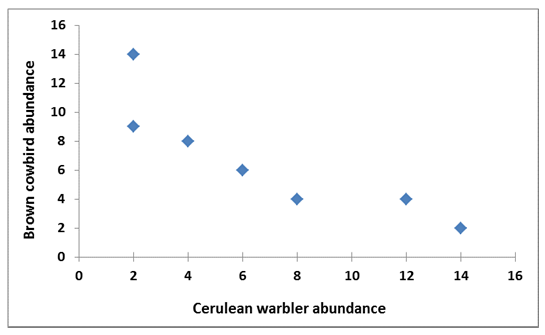Absolute refractory period is the period when the cell is incapable of generating action potential. During this period, voltage-gated Na+ channel undergoes conformational change from (i) ___________________________. This leads to the (ii) ___________ propagation of action potential from axon to axon terminus.
a) (i) inactive conformation to deactivated conformation, (ii) antidromic
b) (i) inactive conformation to deactive conformation, (ii) orthodromic
c) (i) inactive conformation to active conformation, (ii) orthodromic
d) (i) inactive conformation to active conformation, (ii) antidromic
Answer: b) (i) inactive conformation to deactive conformation, (ii) orthodromic
You might also like to view...
The Cerulean warbler is a songbird that breeds in the eastern and middle US and winters in Central America. Its numbers have been rapidly declining over the past 50 years. You are interested in the reason(s) for this rapid decline and set about to make observations and gather data. The graph above shows data you collected on the abundance of Brown cowbirds (nest parasites) and Cerulean warblers at various locations. Based on a visual inspection of the graph, what can you conclude?

A. Brown cowbirds are responsible for the decline of the Cerulean warbler.
B. The abundance of Brown cowbirds shows a negative relationship with Cerulean warbler abundance.
C. Brown cowbird abundance is significantly correlated with Cerulean warbler abundance.
D. The abundance of Brown cowbirds shows a positive relationship with Cerulean warbler abundance.
E. Brown cowbirds do not appear to affect Cerulean warblers.
__________ muscular dystrophy is most common
among __________ and is caused by a __________. a. Myotonic; children; virus b. Duchenne; adults; mutated gene c. Duchenne; children; mutated gene d. Duchenne; adults; virus e. Myotonic; adults; virus
The tertiary structure of proteins is typified by the:a
association of several polypeptide chains by weak bonds. b. order in which amino acids are joined in a peptide chain. c. bonding of two amino acids to form a dipeptide. d. folding of a peptide chain to form an alpha helix. e. three-dimensional shape of an individual polypeptide chain
Which of the following provides the eye with its best defense against microorganisms?
A. Conjunctiva B. Lymphocytes C. Eyelids D. Tears E. Eyelashes